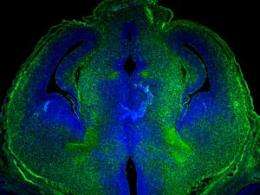Two proteins that regulate cell division co-operate to control neuronal differentiation

Researchers from the A*STAR Institute of Molecular and Cell Biology have identified components of the molecular mechanism that stops neural stem cells from dividing and then promotes their differentiation into different types of brain cells. During development of the nervous system, proteins called cyclin-dependent kinases (Cdks) tightly regulate the balance between the proliferation and differentiation of neural stem cells, but the exact role of each Cdk in these processes is not well understood.
To investigate the function of these proteins, the Kaldis laboratory generated mutant mice lacking the genes encoding Cdk2 and Cdk4, both of which are known to be involved in regulating cell division. The mutant animals died of heart defects at around the fifteenth day of embryonic development, and had brain abnormalities that shed light on the role of Cdk2 and Cdk4 in neural development.
Lim and Kaldis examined the brains of the mutant animals and found that they had a larger hindbrain and enlarged cerebral ventricles compared to normal mice (see image). They also had a thinner neocortex, which lacked the usually distinct boundaries between cell layers. Closer examination revealed that the ventricular zone, which contains dividing stem cells, was unaffected, but that the neuronal layers were diminished by about 46%.
The researchers then isolated neural stem cells from the brains of the mutant and normal animals, and used antibody staining to examine the genes that they express. Cells from both types of animals expressed genes required for self-renewal, suggesting that deleting the Cdk2 and Cdk4 genes does not alter stem cell characteristics.
Although the proliferation of neural stem cells from the mutants was largely unaffected, the cells were more prone to spontaneous differentiation after an extended period in culture compared to those from normal animals. Further experiments indicated that this enhanced differentiation is largely due to alterations in cell division, so that the interval between each round of division is increased.
This may extend the time period over which chemical signals that induce differentiation can act on the cells. The absence of Cdk2 and Cdk4 may also cause an altered biochemical state that primes the stem cells to differentiate into neurons. Together, these results suggest that a high level of Cdk activity favours self-renewal of neural stem cells and discourages them from differentiating.
“We are currently analysing a particular substrate of Cdks in neural stem cells to determine the molecular mechanism of our observation,” says Kaldis.
More information:
Lim, S. & Kaldis, P. Loss of Cdk2 and Cdk4 induces a switch from proliferation to differentiation in neural stem cells. Stem Cells 30, 1509–1520 (2012). dx.doi.org/10.1002/stem.01114
Berthet, C. et al. Combined loss of Cdk2 and Cdk4 results in embryonic lethality and Rb hypophosphorylation. Developmental Cell 10, 563–573 (2006). dx.doi.org/10.1016/j.devcel.2006.03.004
Journal information: Stem Cells , Developmental Cell















